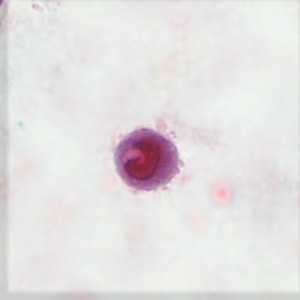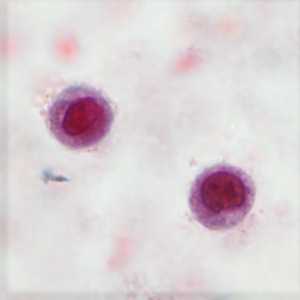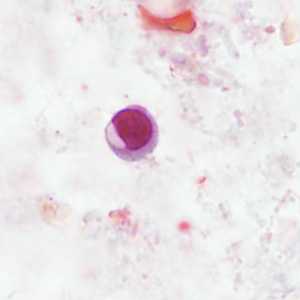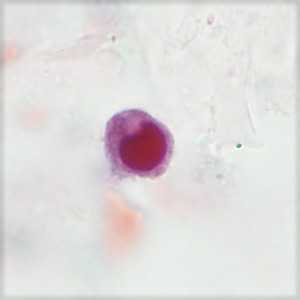
Case #406 - October2015
Stool specimens were collected from a 27-year-old girl from Chad as part of a refugee screening program. The stool was collected in 10% formalin and zinc PVA (Zn-PVA) and sent to the county health department for routine ova-and-parasite (O&P) examination. Figures A-D show what was observed at 1000x magnification with oil on a trichrome-stained slide made from stool preserved in Zn-PVA. The objects shown measured 10-12 µm in length, on average. What is your diagnosis? Based on what criteria?

Figure A

Figure B

Figure C

Figure D
Case Answer
The objects seen in the images are leukocytes (white blood cells). Large numbers of white blood cells (WBCs) are often found in patients with bacterial infections and therefore other tests should be considered. Some types of leukocytes can resemble trophozoites of Entamoeba species, but lack the characteric nuclei containing a single, defined karyosome and peripheral chromatin.
More on: Artifacts
Images presented in the monthly case studies are from specimens submitted for diagnosis or archiving. On rare occasions, clinical histories given may be partly fictitious.
DPDx is an education resource designed for health professionals and laboratory scientists. For an overview including prevention and control visit www.cdc.gov/parasites/.
- Page last reviewed: August 24, 2016
- Page last updated: August 24, 2016
- Content source:
- Global Health – Division of Parasitic Diseases and Malaria
- Notice: Linking to a non-federal site does not constitute an endorsement by HHS, CDC or any of its employees of the sponsors or the information and products presented on the site.
- Maintained By:


 ShareCompartir
ShareCompartir